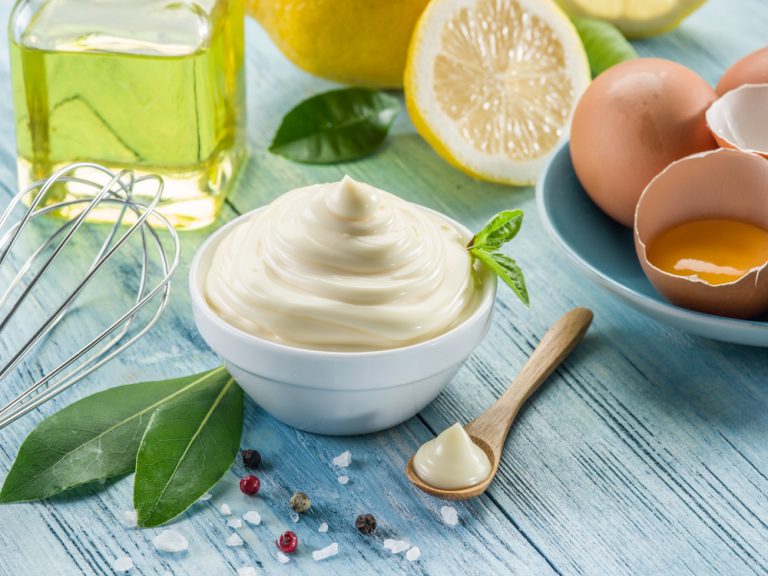Mayonnaise is one of the most common additions to dishes. Store shelves buckle under the jars of mayonnaise. But which one to choose? Which type of mayonnaise is the healthiest one? Does home mayonnaise have the same properties and nutritional value as store mayonnaise? How many calories does mayonnaise have?
What is mayonnaise?
Mayonnaise is a thick sauce made of oil and egg yolks, which originates in France. Currently, not many people prepare mayonnaise at home, although it is not a very difficult process. We most often reach for mayonnaise from store shelves.
Mayonnaise - nutritional values, calories
We distinguish:
- high-fat mayonnaise - over 78.5% fat
- table mayonnaise - 50.5-78.5% fat
- low-fat mayonnaise - less than 50.5% fat
Manufacturers also use the terms salad mayonnaise (thinner, lower fat, often with a poorer composition) and decorative mayonnaise, which has a firmer consistency and does not melt, making it more suitable for decorating dishes.
The classic addition to the preparation of mayonnaise is mustard, which is a natural stabilizer, while egg yolk is a natural emulsifier. A good mayonnaise contains 70-80% fat and 6-7% egg yolks. In addition to mustard, it may contain vinegar and sugar.
According to the classic recipe, mayonnaise is made with olive oil. Currently, in the food industry, the oils used to make mayonnaise are among others rapeseed, sesame, sunflower, cotton, soy and corn ones.
The nutritional value of mayonnaise depends on its composition, mainly on the amount of oil used. It can be assumed that 100 g of mayonnaise delivers on average
- 700 kcal
- 2 g of protein
- 2 g of carbohydrates
- 70 g of fat
Good mayonnaise must be short in composition and contain only
- oil
- egg yolks
- mustard
- vinegar
- water
- flavour additives - natural spices
The vast majority of mayonnaises on the market do not meet this requirement. What undesirable ingredients can we find in shopped mayonnaises?
- calcium disodium EDTA (E385) - Strongly binds minerals, may lead to serious disturbances in metabolism. Children under 2 years of age should not eat it at all. Used as a drug in poisoning with heavy metals. Used as an antioxidant that extends the shelf life of mayonnaise.
- modified starch (E 1404-1452) - modified starch does not come from genetically modified plants, but its structure is subject to physical and chemical modifications, thanks to which it has emulsifying, thickening and stabilizing properties. In mayonnaise, it is added to mask too little oil or egg yolks content.
- carotenes (E 160a) - carotenes are not harmful to health. It is quite the opposite because they are components of vitamin A. We cannot be sure, however, whether they are natural or synthetically obtained carotenes. In mayonnaise, they extend their shelf life and add colour when the amount of egg yolks is too small.
- the citric acid (E 330) - acidity regulator. It occurs naturally, e.g. in citrus, but synthetic acid is used in food products. It is considered as generally safe.
- guar gum (E 412) and xanthan gum (E 415) - stabilizing and thickening agents whose task is to maintain the appropriate structure of the mayonnaise by using too small amounts of its specific ingredients.
- potassium sorbate (E 202), sodium benzoate (E 211) - preservatives, they are needed in mayonnaise that contains too much water.
- powdered eggs - theoretically, it is not a harmful product, but processed - pasteurized, dried and grounded they are far from natural eggs.
Mayonnaise may contain gluten. Therefore, people who cannot consume this gluten should read labels carefully.
Dietary substitutes for mayonnaise
To reduce calories, in many cases it is enough to replace the mayonnaise with natural yoghurt. It will work well in salads and sauces. For a thicker consistency, use Greek yoghurt as a base.
A great dietary imitation of the taste of mayonnaise is the mayonnaise sauce - just mix cottage cheese with mustard and egg (boil the egg until the yolk is not dry).






